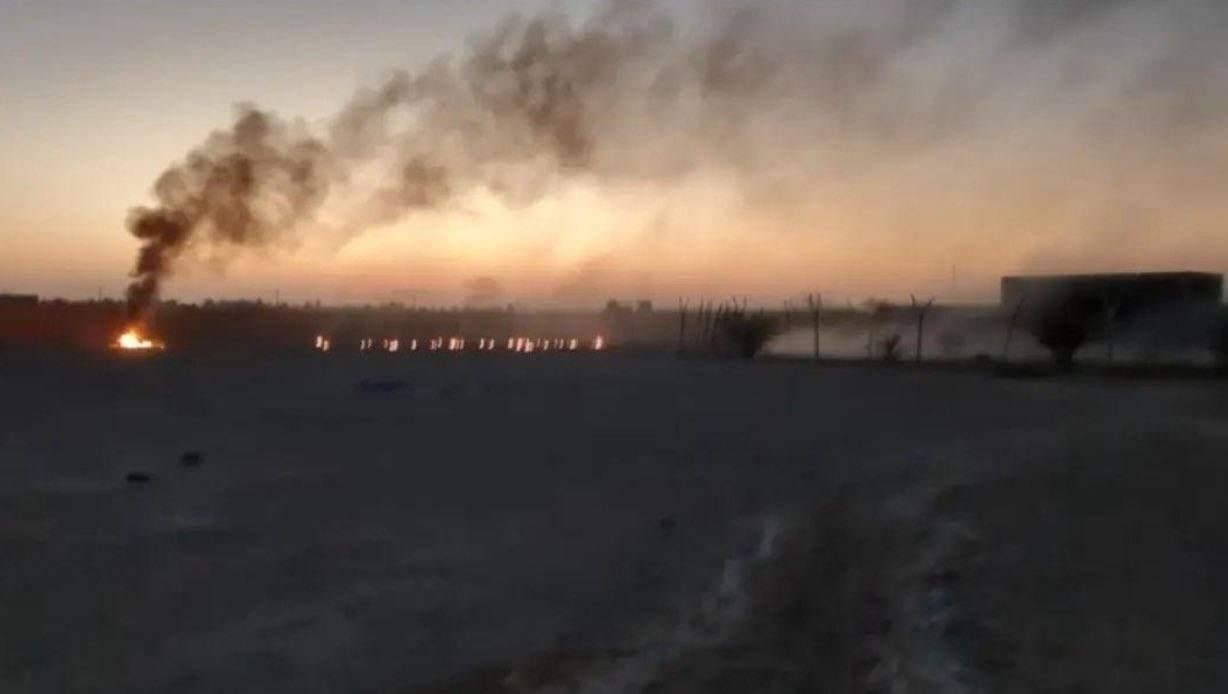-
Pakistan has sent off rocket strikes into Iran, killing nine individuals, after Iran did strikes in Pakistan late on Tuesday.
- https://youtu.be/BbMXyUAqWXM?si=Waehk_vNOYRJa6tS
Pakistan said its strikes had hit “fear based oppressor safe-houses” in Iran’s south-eastern Sistan-Baluchestan region.
Iran censured the assault, which it said killed three ladies, two men and four youngsters who were not Iranian.
The country’s unfamiliar service later said it was focused on great friendly relations with Pakistan.
Notwithstanding, it approached Islamabad to forestall the foundation of “bases and furnished psychological militant gatherings” on its dirt.
The equal assaults come as strains in the Center East are high with a few covering emergencies.
Israel is battling the Palestinian gathering Hamas in Gaza and trading fire with Iran-moved Hezbollah in Lebanon.
In the mean time, Iran-moved bunches in Iraq and Syria are focusing on US powers, and the US and UK have struck the Iran-moved Houthis in Yemen, who have been going after transportation.
Thursday’s strikes by Pakistan were the main outside land assault on Iran since Saddam Hussein’s powers attacked during the 1980s – sending off a severe eight-year war.
Pakistan’s unfamiliar service said its strikes around the Iranian city of Saravan had come considering “tenable knowledge of approaching enormous scope fear based oppressor exercises” and added that it “completely regards” Iran’s “sway and regional respectability”.
In its own articulation, Pakistan’s military said the “accuracy strikes” were directed with robots, rockets and long-range rockets and designated the Balochistan Freedom Armed force and the Balochistan Freedom Front.
The two gatherings are important for a very long time long battle for more prominent independence in Balochistan, a far off district in south-western Pakistan.
Pakistan had furiously denounced Iran’s strike on Tuesday, which struck a region of Pakistan’s Balochistan area close to the Iranian line and which Islamabad said killed two kids.
The country’s previous unfamiliar pastor, Bilawal Bhutto Zardari, told the BBC he was astounded at the assault since Iran’s unfamiliar clergyman met with Pakistan’s acting top state leader on “the day they abused the sway of our country”.
He added “it would be an error” for a country to figure Pakistan can’t answer infringement, and says it sends a “unmistakable message that Pakistan has both the will and capacity to answer”.
Iran demanded its strikes were pointed exclusively at Jaish al-Adl, or “multitude of equity”, an ethnic Baloch Sunni Muslim assailant bunch (previously called Jundullah) that has done assaults inside Iran, and not Pakistan’s residents.
Iranian state media wrote about Thursday that Tehran had brought Pakistan’s chargé d’affaires over the strikes. Pakistan had before reviewed its diplomat and impeded the Iranian agent from returning.China, Turkey and the Taliban government in Afghanistan have all called for restriction and discourse.Prior in the week Iran likewise went after focuses in Iraq and Syria. It said it had hit Islamic State and Israel’s Mossad spy organization, the two of which it said had been engaged with a bomb assault in the Iranian city of Kerman recently which killed 84 individuals.

-
Iran shows rocket capacities with local strikes
Iran and Pakistan have muddled yet friendly relations. Their priests met at Davos this week and their naval forces led joint practices in the Waterway of Hormuz and the Bay.
The two nations have comparative worries about the rebellious line region, where drug bootleggers and aggressor Baloch bunches are extremely dynamic.
After the two arrangements of air strikes, each side appeared to be restless to underscore that these didn’t address assaults on a charitable neighbor.
Tehran’s response to the Pakistani strike shows up somewhat muffled and the specialists have said that the people in question, who included ladies and youngsters, were not Iranian nationals.
Michael Kugelman, South Asia chief at the Wilson Place, expressed that while Pakistan’s reprisal raises the gamble of acceleration, “it additionally gives a chance to move away from the edge”.
“In actuality, the different sides are even at this point. Islamabad had serious areas of strength for a to attempt to reestablish prevention, particularly with Iran in all out attack mode around the more extensive locale conveying direct strikes and intermediaries to hit out at dangers and opponents. Basically, assuming Pakistan had kept down, it would have confronted the gamble of extra strikes,” he said.
Others proposed that the public authority in Islamabad was feeling the squeeze to answer. The country, which saw its previous chief Imran Khan eliminated almost quite a while back, is holding a political decision one month from now.
“There was a ton of public tension on the public authority to follow through with something and so they have done this equitable to demonstrate that they are at the very least [Iran], this demonstration of saber-shaking,” said resigned Lt General Asif Yaseen, a previous Pakistani protection secretary.
In any case, he said he had a “premonition that this will stop here for both the nations” and Pakistan could now be in a situation to restart exchange with Iran.
A few reporters have proposed Iran’s strikes on Iraq, Syria and Pakistan this week were likewise determined by the ongoing fierce elements in the Center East.
Tehran has said it would rather not engage in the more extensive Israel-Gaza struggle, however bunches that it backs have been focusing on Israel and its partners to show fortitude with the Palestinians.

Nonetheless, Shashank Joshi, guard supervisor at The Financial specialist, said he doesn’t really accept that the strikes are a result of the 7 October Hamas assaults on Israel, which killed around 1,300 individuals and set off Israeli counter against Hamas in Gaza, which authorities from the Hamas-run wellbeing service there say has killed around 24,000 individuals.
“The story here is about Iran utilizing its muscles, maybe shocked by what it saw as a horrifying attack on its country,” he told BBC Radio 4’s Today program, alluding to the dangerous bomb assault in Kerman recently, which he portrayed as “the most obviously awful psychological militant assault in Iran since the unrest of 1979”.
“Iran is injured and is erupting. I believe there’s no convincing motivation to say the besieging was brought about by, or is a result of 7 October,” he said.
He adds that this is “not whenever there first have been line strains, yet it is by a wide margin and away the most serious heightening in pressures that I can recollect”.
https://www.youtube.com/live/lY7bIITaw98?si=lvedgbO3zYXcewDk

